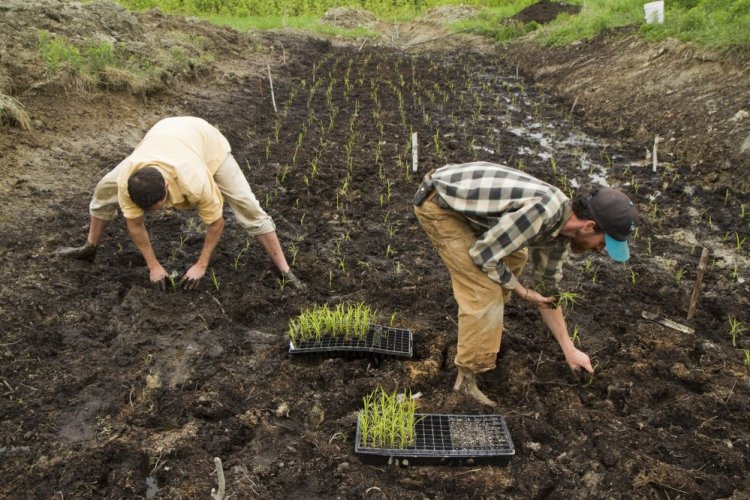BENTON — When you think of farms throughout Maine, crops such as blueberries and potatoes are probably the first things that come to mind. But at a farm in Kennebec County, the specialty crop is probably the last one that comes to mind for the state: rice.
Ben Rooney, co-owner and farm manager for Wild Folk Farm on Wyman Road, said he began farming rice simply to try it out. It wasn’t something he had planned to do, but when the farm was founded five years ago, Rooney said the intent was to try different things.
“For me personally, I’m interested in experimentation,” Rooney said.
If farming rice in Maine sounds out of the ordinary, that’s because it is, Rooney said. The practice is uncommon in the state, but Rooney said many kinds of rice grow well in Maine’s climate. Last year the farm produced 2,500 pounds of rice. This year, Rooney said he’s aiming for 4,000.
“Most people don’t believe me when I say we’re growing rice,” he said.
But people can see it for themselves Saturday, when Wild Folk Farm, which borders Flood Brothers Farm in Clinton, will host its second annual rice paddy transplanting party. Beginning at 10 a.m., Rooney said, visitors can help plant rice paddies, which are flooded parcels of land ideal for growing rice; build a new paddy; and have the chance to see the farm and learn how it’s possible to grow rice in Maine. After a tour and a history lesson from Rooney in the afternoon, there will be a dinner at 7 p.m., then live music and a bonfire.
The clay soil found at Wild Folk is good for creating rice paddies and growing rice, Rooney said. The paddies also have become a destination for migratory birds and a home for turtles, frogs and toads, as they have become a kind of wetland. Prior to Wild Folk experimenting with rice, Rooney said, the land was just a marginal pasture. He said those who come to the party will be surprised by what they see and will feel like they’re “in Vietnam or somewhere outside Maine.”
The farm grows 12 kinds of rice, including Japanese short-grain brown rice, African red rice, a long-grain rice from Chile, medium-grain rice and Italian risotto rice. Strawberries and a mix of vegetables also are grown on the farm.
Rooney said last year the farm sold products through a community supported agriculture system that connected producers with consumers. This year the owners plan to sell more products wholesale, he said.
The rice is a hit, both for food and for seeds. Rooney said he’s sold the farm’s rice across the country, from Hawaii to locally in Maine, and around the world to places such as Croatia and the United Kingdom.
Most of the work is done by hand on the farm, which Rooney called a “diversified small-scale organic farm.” It relies on human power driving hand and wheel tools and the ecological mindset to farm the land.
While Rooney said Wild Folk is pretty much at capacity for the rice it can grow, he said he’s excited about finding other places in Maine with farmers eager to try planting the crop. Rooney said it’s a “smart way to grow food,” as they were able to turn the pasture land into something new and unique. When Wild Folk was founded in 2012, Rooney said, the owners just wanted to experiment with the land and figure out the identity of the farm.
“I tried a lot of things that didn’t work,” he said.
When he read a book called “The Power of Duck: Integrated Rice and Duck Farming,” by Japanese farmer Takao Furuno, he was inspired to try planting rice. While the goal from the outset wasn’t to start a rice farm, he said, the experiment has worked out well. That success has made him passionate about getting other farms to start growing rice in paddies, which help create wetlands and are more productive and fertile than dry land.
“We can be growing a lot more food in a sustainable way,” he said.
Colin Ellis — 861-9253
cellis@centralmaine.com
Twitter: @colinoellis
Send questions/comments to the editors.


